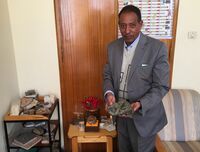Date: Thursday, 23 August 2018

Eritrea is considering building a port on its Red Sea coastline to export potash from deposits being developed in the Horn of Africa nation, a mines ministry official said.


Alem Kibreab
“To begin, the company has to make money,” Alem said.
Danakali expects construction of the $320 million mine to start later this year, Chairman Seamus Cornelius said by phone from London. The company is engaging bankers to secure funding for construction of the mine, he said.
“Those discussions have accelerated” following the recent rapprochement between Eritrea and Ethiopia, he said. “With the rapid changes and the rapid improvement in the geopolitical situation, things we weren’t thinking were possible in the past are now possible.”
Eritrea gained independence from Ethiopia a quarter of a century ago. The two countries had been at odds since a 1998-2000 war that claimed as many as 100,000 lives and have each harbored rebels hostile to their neighbor. Last month, they agreed to implement a long-delayed peace agreement that ended the conflict.
Construction of the mine is expected to take about two years, before the start of production that will eventually rise to 472,000 tons per year, Cornelius said. Output initially will be shipped from the existing Eritrean port of Massawa, which has sufficient capacity to handle the mine’s exports but is further away than Anfile, he said.
Alem said Anfile could be used by potash projects being developed in Ethiopia as an export route, instead of Djibouti, which is farther away. Oslo-based Yara International ASA plans to establish a $700 million potash plant near the Eritrean border, while British Virgin Islands-registered Circum Minerals Potash Ltd. has a mining license there covering 365 square kilometers (141 square miles).
Djiboutian ports authority Chairman Aboubaker Omar Hadi didn’t respond to emails requesting comment on whether its Chinese-built Tadjourah port to serve potash companies in Ethiopia has been completed in time for production planned this year and whether a 128-kilometer road linking the port to the Ethiopian border is complete.
“It’s a no-brainer that if you could have a port there and potash on the Ethiopian side, obviously you will choose that port,” Alem said. “Before the peace came, that was an impossibility.”